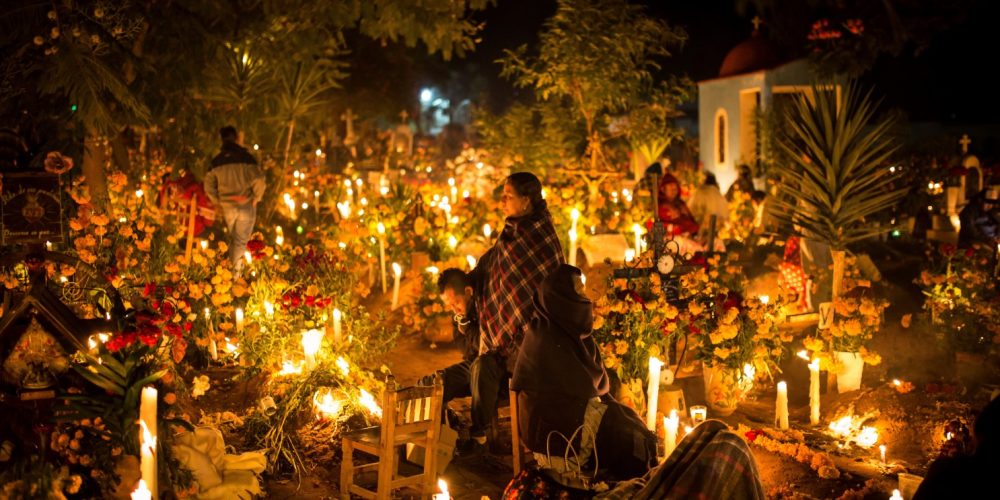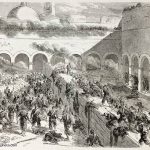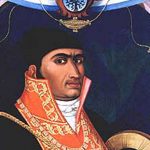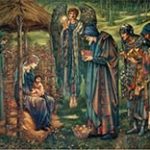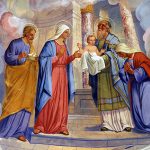The Day Of the Dead
Movement starts in the graveyards across the country. The solemn air that fills the lands of sorrow and duel is reshaped with the friendly warmth that’s carried by families, they walk proudly through the resting place, melancholic eyes hide in the faces of celebration. Through their pain they smile. This is a party for those we miss. When faced against their gravestone we do not succumb to the hole they left in our soul. We allow their idea to makes us whole again. This day, they walk alongside us and remind us that they never left. This is the day of the dead.
In houses, schools, public plazas, a golden shrine.
A rich yellow flare caresses the streets, guiding all souls into a sacred place. A place of peace and memories, a stairway of tales and dreams. A wound in our hearth gets exposed, we show our mourn, we adorn it. We dress it in papel picado, we cover it in cempasúchil, we let candlelight shine over the fondly remembered faces. Their pictures look at us, they make their presence be felt. We welcome the lost with objects they cherished. Mundane pleasures gain a new light filling the room with the ghost of moments lost. The cigarettes that were once an annoyance, now become the memory of a mellow afternoon. Their favorite foods imbue their air with the peace of a thousand dinners. The toys they grabbed in their little hands sound with the laugh of a short-lived dream. We are nourished by their presence. In these memories we are reunited.
A mosaic of Mexico’s passion is exposed to the world.
In a little town a dissonant song is heard through the streets, bells of different sizes ring from churches’ tops, the sound of solemn duty guides all towards the graveyard. Kids walk alongside their parents watching the ceremonial parade and take part in the wordless oath of tradition.
Women in colorful dresses walk on the streets, their skeleton-painted faces are shadowed by giant ornamented hats. La Catrina is how we see dead. Always smiling, always cheerful, always welcomed. And on this day, She dances beside us.
Families prepare to go to sleep. The goodnight wishes are given as usual. Blankets and pillows are passed around. through the candlelight, they stare at the sky. The rough touch of the graveyard’s ground kisses their body as they lie peacefully. On this day the whole family sleeps beneath the same star-covered ceiling. The ones that remain beside the ones that are no more. Together they sleep in this land of eternal slumber.
A little box is opened with ceremonial care, instruments are taken out by hasteless hands. A brush gets the center of attention. Carefully he faces the thin yellowish bones that once stood beside him. He firmly grabs the remains of those who have departed, he holds them with care and love. And in peace he starts cleaning.
In cities and towns, kids get dressed in colorful costumes. Little monsters of folklore roam the streets in search of candy and a pleasant night. A foreign tradition grabs the attention of those who only know the day of the dead for its sweet bread and the smell of the marigold. Of those too young to feel the ghost around them.
And the bells keep ringing.
A tradition beyond beliefs, outside reason or religion.
Human life is too complex for us to comprehend, so we make do with its idea. We welcome people in our lives and take on many faces; a son, a father, a friend, a lover. For those who become part of us we are defined by our actions, by our virtues and weaknesses. To the world that surrounds us we become these ideas. And when we are gone, this idea is what’s left behind.
We summon our loved ones through rituals and altars, we embrace their idea and let it fill the air, we welcome it into our hearts. We invoke their spirit. And in wholeness we rest. We observe a world reshaped by tradition, we breathe the sweet smells of celebration, of cempasúchil, mole, and pan de muerto. Amidst the light of the candles echoed in the picture frames, we laugh. This is a party. This is the Day of the Dead.
∗ ∗ ∗
The name at the end of this text belonged to a loving man. In my mirror I see his face. In my actions I see his teachings. I’m grateful for sharing credits with him. His idea brought this to life.
∗ ∗ ∗
By. Víctor Suárez.
Calendar of Celebrations, Events, Festivals, Festivities, Holidays and Observances in México.
There are three types of holidays and observances in Mexco: statutory, civic, and festive celebrations that are observed in Cabo San Lucas, San Jose del Cabo, Los Cabos, Baja California Sur and the rest of Mexico.
Statutory holidays in México (known here in Mexico as “feriados” or “días de asueto”) are legislated through the federal government and ruled by the Federal Labor Law (Ley Federal del Trabajo). Think of them like you would federal or bank holidays in the United States. Most public and private employees are entitled to take off statutory holidays — with regular pay. Some employers, though, may require work those days. In that case, they would be required to pay the regular salary plus double time, again much as one would expect in the United States. When a statutory holiday falls on a Sunday, Monday is considered a statutory holiday; if a statutory holiday falls on Saturday, Friday will be considered a statutory holiday.
Civic holidays in Mexico are observed nationwide, but employees are not entitled to a day off with pay.
Festive traditional Mexican Holidays honor religious events, such as Carnaval, Holy Week, and Easter. There are also public celebrations, such as Mother’s day, Father’s day, Valentine’s Day, and the like.
Statutory Holidays and Civic Holidays
Statutory and Civic Holidays are known as (known in Mexico as “feriados” or “días de asueto”). Examples are New Year’s Day, Mexican Constitution Day, Birthday of Benito Juárez, Mexico Labor Day, Mexico Independence Day, Change of Federal Government in México, and Christmas. www.loscabosguide.com/statutory-and-civic-holidays/
- February 24 – Día de la Bandera Mexican Flag Day
- May 5th – Cinco de Mayo Battle of Puebla in1862
- June 1st – Día de la Marina Mexican Navy Day
- Sept 30 – Birthday of Jose Maria Morelos y Pavón
Festivities and Festival – traditional holidays to honor religious events
Listing of Festivities, Festivals, and Traditional Holidays to honor religious events in Los Cabos, Mexico. Examples include
The Epiphany, or Three Kings Day, Feast Day of San Antonio de Abad, Day of the Candles or Candlemas Day, Valentine’s Day
Saint Valentine’s Day, Ash Wednesday, Festival of San José del Cabo (St. Joseph), Day of the dead, Day of the Virgin of Guadalupe, and others. www.loscabosguide.com/festivities-festivals-holidays/
- January 6th, Feast of Epiphany – Reyes Magos
- February 3rth – Día de la CandelariaDia de Candlemas
- February 23 to 28, 2017 Festival de Carnaval La Paz
- March 15 – 20 – Festival of San José, Patron Saint
Cultural Festivities – Days of Cultural Importance and Commemorative Days
Examples are Mother’s Day, World Red Cross Day, Day of the Founding of the Capital of BCS, La Paz, The death of Porfirio Díaz, The Day Baja California Sur was declared Free and Sovereign state, The meeting of Moctezuma II and Hernán Cortés, and other important events for Mexico and the world. www.loscabosguide.com/mexican-cultural-festivities/
- Mother’s Day
- International Red Cross Day
- World Teachers Day
- Mother Earth Day

